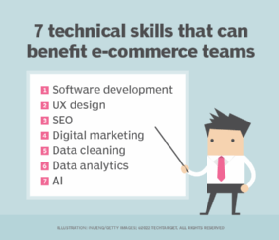[ad_1]
The vast world of e-commerce continues to expand as commercial transactions over the internet reach virtually every facet of daily life.
While e-commerce requires customer-focused skills like communication and marketing expertise, professionals who run e-commerce platforms can benefit from technical skills like UX design and data analytics. Explore seven IT skills that can benefit e-commerce platforms.
1. Software development
Professionals with computer programming backgrounds can start with the design, creation and maintenance of e-commerce software. They can apply the same skills used to build and test other applications to e-commerce apps, including websites, web-based apps, mobile apps and embedded IoT systems that facilitate, manage and monitor various commercial sales operations.
2. UX design
For a narrower focus within software development, UX design principles can benefit e-commerce software. In many cases, UX design is less about web development and more about front-end design and engineering. Proper designs can create user-friendly software.
While UX doesn’t require the ability to code, most designers have programming and software engineering backgrounds. They then use that technical background to learn new skills and build aesthetically pleasing, seamless and intuitive apps.
3. Search engine optimization
Search engine optimization (SEO) techniques can help attract new customers. Generally, SEO involves advertising a web-based platform with strategically placed keywords so it ranks higher than competing platforms on search engines.
SEO for e-commerce takes general SEO skills and applies them to commercial sales transactions. Brands must be visible to maximize consumer interest for an online product or service, so e-commerce teams must understand SEO to rank highly in organic searches.

Additionally, SEO has extended beyond search engines to social networking sites including Facebook, Instagram, Twitter and YouTube. For these platforms, a dual focus on keyword placement and customer engagement can help gain more traffic.
4. Digital marketing
While people often lump SEO into the field of digital marketing, SEO practitioners often possess stronger technical backgrounds that include coding. For people lighter on technical skills, they can start with digital marketing.
Common e-commerce marketing practices include the following:
- email campaigns
- mobile marketing
- social media marketing
- search engine advertising
Most digital marketing professionals in e-commerce understand a mixture of marketing, online sales and basic technical concepts.
5. Data cleaning
E-commerce teams can collect and analyze customer and e-commerce transaction data. However, they must organize, update and maintain the data to easily analyze it with manual or automated processes. This process is called data cleaning.
Data cleaning involves taking in large amounts of collected data, sifting through it and organizing relevant data points to later analyze and act upon. E-commerce teams can use information such as customer sources, preferences and habits to target new and existing clients and drive traffic to e-commerce platforms.
6. Data analytics
After data cleaning, e-commerce teams can analyze relevant data and discover new and unique ways to garner interest in a product or service. Data analytics professionals require both technical and non-technical skills to be successful in their roles.
Examples of technical skills include the following:
Soft skills, on the other hand, include a deep understanding of the business’s goals for an e-commerce platform and general organization skills, conceptualization and inventiveness.
7. Artificial intelligence
As with most other technical fields, AI is quickly gaining momentum in e-commerce. Examples of AI used within e-commerce include the following:
- purchase recommendations
- virtual assistants and chatbots
- anti-counterfeiting mechanisms
- automated analytics
- customer profile building
Most e-commerce platforms may soon include AI. If e-commerce teams want to learn more, they need IT skills like programming, data collection and curation, data analysis and software modeling.
Key takeaways
Many technical and non-technical skills overlap in e-commerce. Thus, professionals in this field may not want to focus on a single role or title. Instead, learning the technical basics can help build a foundation to explore the various roles within e-commerce as the field continues to grow.
Most people start with computer programming, digital sales and marketing. Once they hone these skills, they gain a clearer understanding of what specific area they should focus on next.
[ad_2]
Source link














